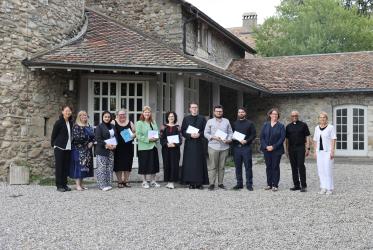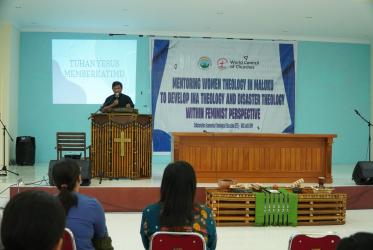Continuation Committee
on Ecumenism in the 21st Century
18-20 November 2007
Bossey (Switzerland)
Introductory Remarks:
Six central Questions for the future Work of the Committee
Georges Lemopoulos, Deputy General Secretary, WCC
.pdf version (29 Kb)
I have the great honor to warmly welcome you on behalf of the General Secretary of the WCC.
Rev. Dr Samuel Kobia has particularly entrusted me with the task of ensuring you that the WCC is committed to actively participate in this new and common exploratory journey. The Council is indeed determined to work, in close cooperation with all its partners, for the continuation of the process inaugurated some time ago and being reactivated today.
The Policy statement "Common Understanding and Vision of the WCC", adopted in 1998, had highlighted the importance of relationships within the one ecumenical movement (the relationship between the WCC and regional, national and local councils of churches, with Christian World Communions, International Ecumenical Organizations, and churches which are not members of the WCC, particularly the Roman Catholic Church and Evangelical and Pentecostal churches). It was clearly affirmed that these relationships should be characterized by a spirit of mutuality and cooperation, by a practice of shared tasks and resources, by a common policy of avoiding competition and the demarcation of areas of influence.
As we are coming together for the first meeting of the continuation committee - one of the new instruments which were fully embodied to the Council's consultative bodies -, we are deeply aware that we are moving from the dynamics of a statement that defines the institutional policy to a common journey, during which shared ownership will have to prevail on any individual institutional interests.
In this spirit, our General Secretary reaffirms the WCC's commitment to addressing today, together with ecumenical partners, the question of how relationships can be strengthened between ecumenical actors and partners to ensure greater coherence of the ecumenical movement and greater effectiveness in the common Christian witness and service to the world.
The delay in convening this meeting
We may begin with a few comments about the timing of our encounter. One could, very rightly, regret the delay in organizing this first encounter of the continuation committee. There might be a number of explanations (complexity of the nomination process, at lest for some of the participants; pre- and post-assembly workload for the WCC, etc.) but it is true that we could have dealt with this matter in a better way.
However, we could also look at this period from the Cahavannes-de-Bogis consultation till now from a positive perspective. Indeed, since 2005, there have been significant developments which will undoubtedly inform the work of the continuation committee (general assemblies; the central place given to Ecumenism in the 21st Century in the Council's programmatic activities; some advance in the discussions with specialized ministries; the discussion on "expanded assemblies"; the first meeting of the Global Christian Forum, etc.)
A few of these developments are already included in the agenda of our meeting. Therefore, let us consider the moment of our encounter as an appropriate moment, a kairos that can mark the whole process.
Six questions
I do not intend to develop any comprehensive analysis here. This will be your task. I would rather like to present a discussion starter. For that, I would simply invite us to consider the six questions the General Secretary of the WCC had proposed to the consultation on Ecumenism in the 21st Century1 in his Opening Remarks.
Here are only a few reflections - rather a few further questions - that we have developed with my colleagues, as we were preparing ourselves for this meeting:
1. What is the vision of the ecumenical movement (marks and core values)?
Fragmentation today is not just a consequence of the proliferation of ecumenical organizations, it is also a consequence of the fact that centrifugal forces are, at this stage, not counterbalanced by the vision of unity and common witness that was embodied by the WCC in the past. Fragmentation has become a mark not only of the ecumenical movement, but also of ecclesial life. "While people say that Christianity is growing in Africa, Christianity is being fractured in Africa", states Bishop Mvume Dandala2.
The basis for the old threefold vision (unity, witness, service - koinonia, martyria, diakonia) seem to be less and less understood. The concept of unity has become opaque and is challenged in various ways. An expression of this is the prevalence given to clarity (truth) in issues of personal ethics and moral life as markers of traditional life-styles that are to be defended against new relativizing influences at the expense of common, multi-lateral efforts towards greater unity.
Under the impact of the changing context (globalization, shifts in social organization, changing ecclesial landscape, religious plurality and tensions), the broader ecumenical movement has lost common vision and structure. There are claims for its renewal. There are claims for its radical redefinition (including the search for alternatives to the terms "ecumenical", "ecumenism") There are different entry points and ways of looking at the vision. The question then is:
How do we go beyond our own "internal" ways of articulating the vision and begin to discern and to embrace other points of emphasis and interpretations of the vision? What do we value together and how do we support it?
2. How to balance the broadening and the deepening of the fellowship (emphasis on accountability)?
Pursuing the deepening of the fellowship and broadening participation in the ecumenical movement are two tasks that are not without tensions and possible conflicts between them.
In the light of recent developments (Global Christian Forum; formation of new ecumenical organizations following the model of "Christian Churches Together" and including in their membership Pentecostals and Evangelicals, etc.) we may need to ask ourselves:
Are the ways how we describe the tension (i.e. membership versus participation; accountability versus opting in etc.) really adequate? Do we need to review the underlying perceptions, assumptions?
3. How far are you willing to change (who? just the WCC?)
When the process started, emphasis was on the institutional side of the ecumenical movement and, therefore, the tentative terminology included concepts such as "architecture" and "configuration". There has been since a shift in the thinking, but it becomes more and more clear that at a very early stage of the process we have to respond with clarity and determination to a fundamental question:
Do we seek incremental change' (i.e. mere institutional, managerial solutions/arrangements) or a deep change', a radical conversion' (i.e. new ways of thinking and behaving; new ways of relating to one another)? What does this mean for each and every actor in the ecumenical movement? What would be the role - or the expected contribution - of the WCC? As far as the later is concerned, we are aware that this question is already high on our agenda, particularly when we are challenged to conceive and prepare the next assembly in a different way?
4. Who sets the agenda (Youth-marginalized/new voices)?
Our efforts to rearticulate the vision and the fundamental values of the movement should be coupled with an effort to explore the best possibilities for an inclusive agenda. Three questions may help us in this task:
What are the voices that are marginalized, and how would it be possible to listen together to these voices?
Is there a newly emerging common agenda, beyond the old dividing lines -- of Pentecostals, Evangelicals, "Ecumenicals", etc. -- in Africa, Asia, and Latin America? If so, how could challenges from the local/regional context influence reflection and efforts at the global level?
And finally, to what extent do different ecumenical organizations really respond to the realities of the churches, to the crises and the blessings they experience, to their hopes and aspirations? Would there be greater synergy if the reality of the churches would more clearly inform the agenda?
5. How to ensure that spirituality is at the centre?
Late Metropolitan Paulos Mar Gregorios had spelled out some elements of an alternative vision for churches and ecumenical organizations, ensuring that a spiritual vision and attitude was really at he centre: "In this alternative perception of reality, the centrality of the humanity will not, as in the secular perception, be of domineering nature, but will be entirely mediatorial, i.e. manifesting wisdom, power, glory, beauty, goodness and love, not humanity's own, but wholly dependent upon and derived from the Transcendent, as well as embodying in ourselves the whole universe as we offer it up along with our own living selves to the Transcendent in loving adoration"3. The question that we have to seriously and sincerely consider here would be:
Are we driven fundamentally by a spiritual vision and theological insights or a mere organizational momentum?
6. How to ensure constant renewal (youth, ecumenical formation?)
This is probably an area where we observe a wide consensus. Ecumenical formation is high on the agenda of many ecumenical players. It constitutes an area where a significant exchange of resources is already taking place. It is considered as one of the most important ways for the renewal of both churches and ecumenical organizations. A simple look at the Institute that hosts our consultation will certainly confirm this perception. In addition, we have a significant indicator, since the need for ecumenical formation is surfacing in all visits to member churches but also in common agendas with ecumenical partners (e.g. the JWG between the RCC and the WCC; the relationships between the WCC and specialized ministries, etc).
How could we become more intentional and more strategic in this area, would be the question we may have to tackle together.
A word of conclusion
As we look at the lives of our respective churches and the work of our respective ecumenical organizations, there is no doubt that changes are taking place on practically every front. Most of these changes are the natural consequence of the immense challenges humankind is facing today. The times therefore call for discernment, and for courageous visions of hope.
We are therefore called to "read the signs of the times" together, and to discern the best ways of sharing with the world the good news, so that "the world may believe". It will not be easy. But we trust each other and count on each other. And more than this, we trust the Holy Spirit, prayerfully asking the Paraclet to guide us into all truth (Jn 16:13).
------------------
Footnotes:
1 Ecumenism in the 21st Century, Report of the Consultation Convened by the WCC, Chavanne-de-Bogis, 30 November-3 December 2004, WCC, Geneva, 2005, pp. 33-37.
2 Ecumenism in the 21st Century, ., p. 17.
3 Paul Mar Gregorios, « Towards a New Enlightment », quoted by Fr K.M. George, The Orhodox Tradition and Transfigureative Ethics, in: Grace in Abundance - Orthodox Reflections on the Way to Porto Alegre, WCC, Geneva, 2005, p. 62.





